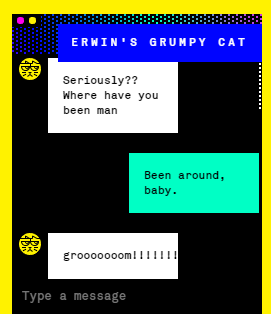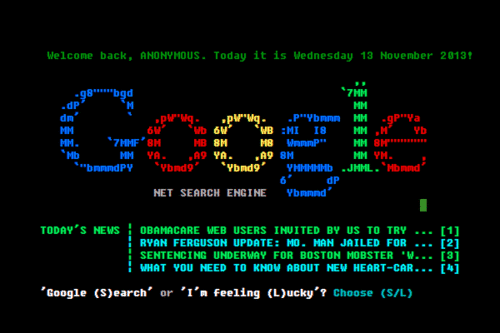
One-Line Languages
It’s more common to converse with a computer than to just dictate our instructions to it.
I’ve been helping a friend with a Discord bot, which has opened my eyes to the explosion of chatbots in recent years. Yes, there are the really lame chatbots, usually AI-driven—I searched for “lame chatbots” and was guided to chatbot.fail, but there’s also the spoof ‘Erwin’s Grumpy Cat’ on eeerik.com.

We’ve also quietly seen widespread use of sweet IRC-style bots, such as Slack or Twitch or Discord bots. These act like incredibly niche search engines, in a way. My friend’s own bot is for a game—looking up stats, storing screenshots, sifting through game logs and such.
So, yeah, we are using a lot of ‘one-line languages’—you can use words like ‘queries’ or ‘commands’ or whatever—but search terms aren’t really a command and something called a ‘query’ can be much more than a single line—think of ‘advanced search’ pages that provide all kinds of buttons and boxes.
Almost everything has a one-line language of some kind:
- Sites like Facebook, Twitter, Wikipedia and YouTube all have search boxes on nearly all of their pages—a single line interface for querying the entire text. (Even general services like text messaging and e-mail have this prominently in their interface.)
- Issuing short commands to voice-recognition machines like Alexa and Siri.
- UNIX tools usually act individually.
- Spreadsheet math done in the fx bar.
- The browser address bar.
- One of my favorites is Pinboard’s URLs, which can be used to find related things using whatever ingenuity you can muster.
- Microwave cook commands.
Humans push the limits of these simple tools—think of hashtags, which added categorical querying to otherwise bland search engines. Or @-mentions, which allow user queries on top of that. (Similar to early-Web words, such as ‘warez’ and ‘pr0n’ that allowed queries to circumvent filtering for a time.)
It’s very interesting to me that misspellings and symbolic characters became a source of innovation in the limited world of one-liners. (Perhaps similar to micro.blog’s use of tagmoji.)
It seems that these ‘languages’ are designed to approach the material—the text, the tags, the animated GIFs—in the most succinct way.
I wonder, though, if ‘search’ is the most impotent form of the one-liner. It’s clearly the most accessible on the surface: it has no ‘commands’, you just run a few searches and figure out which ‘commands’ work until they succeed. (If they do?)

It also seems relevant that less than 1% of Google traffic uses the I’m Feeling Lucky button. Is this an indication that people are happy to have the raw data? Is it mistrust? Is this just a desire to just have more? Well, yeah, that’s for sure. We seem to make the trade of options over time.[1]
Observations:
- The more generic the data (the Web as a whole vs. a creepypasta chat), the more generic the language seems to be.
- Could the Web be viewed as something other than a giant container that we have to randomly access?
- For example, many chatbots work like a conversation—they have a memory, such as for storing quotes/memes, and they can be used as Bayesian filters (for kicking spammers).
- Is it possible to build a meta-bot that uses all the niche bots?
- What one-line language could be extrapolated from micro.blog or Pinboard?
- To what degree can cars, Christmas tree lights, video splicing, disc jockeying, playing video games—be driven by one-liners?
- What would it take to get to two lines?
Some sites—such as yubnub and goosh—play with this, as do most browsers, which let you add various shortcut prefixes.
Oh, one other MAJOR point about chatbots—there is definitely something performative about using a chatbot. Using a Discord chatbot is a helluva lot more fun than using Google. And part of it is that people are often doing it together—idly pulling up conversation pieces and surprising bot responses.
Part of the lameness of chatbots isn’t just the AI. I think it’s also being alone with the bot. It feels pointless.
I think that’s why we tend to anthropomorphize the ‘one-line language’ once we’re using it as a group—it is a medium between us at that point and I think we want to identify it as another being in the group. (Even in chats, like Minecraft, where responses don’t come from a particular name—the voice of the response has an omniscience and a memory.)
It’s also amusing that Google keeps the button—despite the fact that it apparently loses them money. Another related footnote: the variations on I’m Feeling Lucky that Google has had in the past. Almost like a directory attached to a search. ↩︎


